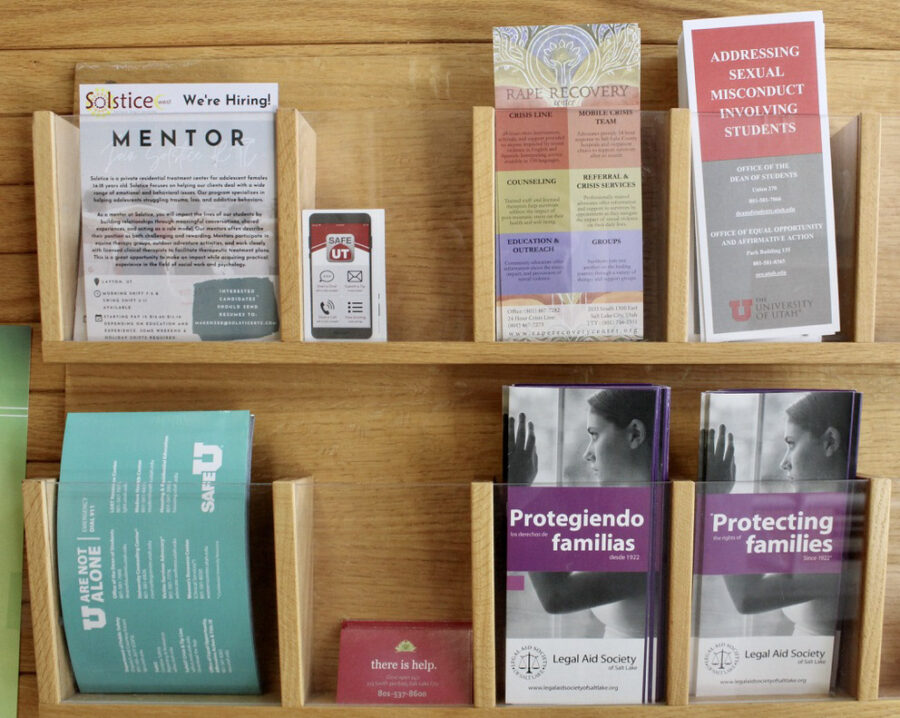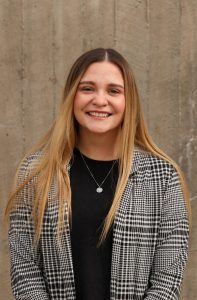U Students and Faculty Hold Multiple Events for Sexual Assault Awareness Month
Inside the University of Utah Student Services Building a wall displays pamphlets with resources for sexual assault and mental health in Salt Lake City, on Tuesday, June 9, 2021. (Photo by Brooklyn Critchley | The Daily Utah Chronicle)
April 19, 2021
This April, for Sexual Assault Awareness Month, University of Utah students and faculty are partnering with local community organizations to raise awareness and support survivors.
The Center for Student Wellness is working with different student organizations and the local community to hold events throughout the month. Each week, there are events going on both online and in person.
The CSW is working with the Bennion Scholars to raise money to create care packages for survivors of sexual and interpersonal violence on campus. Their goal is to raise $900 to put towards creating 50 care packages.
According to the CSW website, “Each package will include items that may help ground and comfort a survivor: blanket, essential oils, chocolate, a fidget toy and a supportive note from a community member.”
The drive ran for the first two weeks of April, with different tiers available for donors to choose from, making participation doable for most budgets. A donation of $20 paid for an entire care package.
For those unable to make a monetary donation, there is the option to submit a thoughtful note to a survivor that is included with each package. People can submit a note online.
One of the Bennion Scholars working on the project is a first-year student, Niyera Nyandagaro.
“We may not experience everyone’s problems firsthand, but we should have some understanding and compassion because we have all faced and have some challenges that impact our lives today,” Nyandagaro said.
Nyandagaro also admits to not knowing prior to joining this project that April was Sexual Assault Awareness Month.
“Now that I’m aware of it, I hope that I can help by spreading more awareness to support all survivors on campus. I want to let them know that they are not alone, and there is a big community that has their back,” Nyandagaro said.
Also during April, CSW will be holding multiple Zoom-based events, including two Gender-Based Violence Consortium events. The first event took place on April 15 and featured the visual production of Utah Women’s Narrative.
The visual production is supposed to honor stories of transgender and nonbinary people, women of color, Indigenous people and anyone who identifies with being on the margins.
The second event was on April 16, with multiple speakers and events. The events are sponsored by the Women of Color Academics Collective, the Women’s Resource Center and Utah Presents.
Themes of the symposium include documenting violence, healing communities and leading social change to end sexual violence. More information can be found online on the Gender-Based Violence Consortium website.
Other local organizations such as the Rape Recovery Center located in Salt Lake City are also working to promote awareness throughout the month of April.
The Rape Recovery Center works to provide resources and bring awareness to college campuses as data from the 2019 AAU Campus Climate Survey on Sexual Assault and Misconduct shows that one in four undergraduate women are sexually assaulted.
One of the campaigns the Rape Recovery Center is promoting this year is “Start By Believing.” This campaign encourages individuals to pledge to believe when someone confides in them that they were sexually assaulted and to support survivors while healing and/or finding justice.
Danielle Martinez, a Rape Recovery Center representative, said that SLC is the most progressive city in the state and has shown progress in believing sexual assault survivors. Martinez also said that believing is an individual act that can eventually become a collective effort, but that there is still much work to be done.
“We need to go beyond believing to enact change,” Martinez said. “The first step is believing and supporting survivors, but to be active in how we support survivors means enacting policies and procedures that value the survivors and support their road to healing.”









